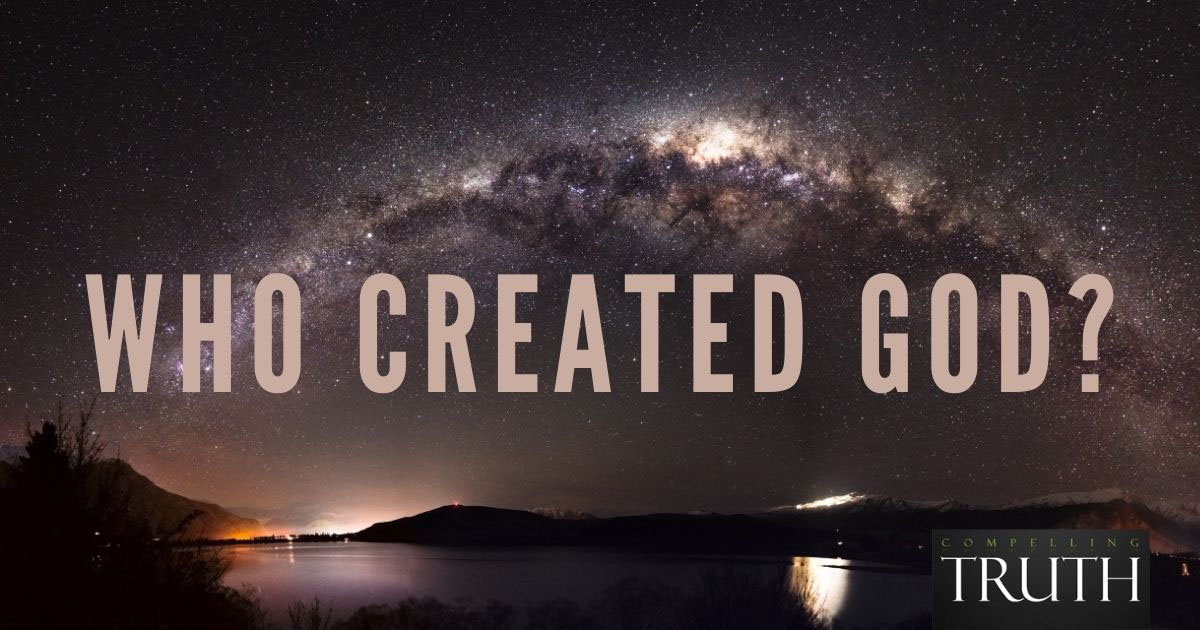Philosopher Rene Descartes (1596—1650), most famous for his statement Cogito Ergo Sum ("I think therefore I am"), also formulated several arguments in support of the existence of God. One of Descartes' arguments for God's existence is based on the "idea of God." A brief and simplified outline of his argument goes something like this.
We have ideas. These ideas originate either from ourselves or from things outside of ourselves. One idea that we have is the idea of God (an eternal and perfect being). This idea could not have been caused by us because we know that we are finite and imperfect, and no effect can be greater than its cause. Therefore, the idea of God must have been caused by something outside of ourselves. The cause of the idea must possess nothing less than the qualities contained in the idea of God (eternality and perfection). Only God has those qualities. Therefore, God must be the cause of the idea of God that we have. Therefore, God exists.
There are myriad arguments for the existence of God (teleological, cosmological, ontological, moral, etc.). However, Descartes' argument is particularly relevant to the question of whether man created the idea of God. Descartes argued that not only did the idea of God come from God, but that it could only have come from God and it proves God's existence.
Famous theologian John Calvin (1509—1564) believed in what he called the sensus divinitatis ("sense of divinity"). That is, Calvin believed that every human being came into the world with an innate awareness of God. In his Institutes of the Christian Religion, Calvin stated,
"There is within the human mind, and indeed by natural instinct, an awareness of divinity. This we take to be beyond controversy. To prevent anyone from taking refuge in the pretense of ignorance, God himself has implanted in all men a certain understanding of his divine majesty. Ever renewing its memory, he repeatedly sheds fresh drops. Since, therefore, men one and all perceive that there is a God and that he is their Maker, they are condemned by their own testimony because they have failed to honor him and to consecrate their lives to his will... Therefore, since from the beginning of the world there has been no region, no city, in short, no household, that could do without religion, there lies in this a tacit confession of a sense of deity inscribed in the hearts of all."
However, we need not lean on the opinions of famous philosophers or even theologians, for the Scriptures themselves are not silent on the subject, and it is the Scriptures alone that carry the authority of God Himself (2 Timothy 3:16).
Romans 1:18–23 states, "For the wrath of God is revealed from heaven against all ungodliness and unrighteousness of men, who by their unrighteousness suppress the truth. For what can be known about God is plain to them, because God has shown it to them. For his invisible attributes, namely, his eternal power and divine nature, have been clearly perceived, ever since the creation of the world, in the things that have been made. So they are without excuse" (emphasis added).
Paul clearly states that it is God who has shown mankind what can be known about Himself. Since when? Since He created the world. How? Through the things that have been made. An illustration of this truth can be seen in Psalm 19:1–2, which states, "The heavens declare the glory of God, and the sky above proclaims his handiwork. Day to day pours out speech, and night to night reveals knowledge." The heavenly bodies pour forth knowledge of God's existence day and night. As we gaze into the night sky, do we not sense something of the awesome power of God who created all things?
It is not merely creation but providence also which testifies to the existence of God. Acts 14:17 states, "Yet he did not leave himself without witness, for he did good by giving you rains from heaven and fruitful seasons, satisfying your hearts with food and gladness." God's kindness in providing for His creatures witnesses to His existence (Matthew 6:26). God not only creates but provides for His creation.
Finally, God witnesses to His existence by giving mankind conscience, by which they have a sense of right and wrong, along with a sense that they will ultimately be held accountable to God for their actions (Romans 2:15–16). Ecclesiastes 3:11 says that God "has put eternity into man's heart."
All of this is what theologians refer to as general revelation, and it provides mankind with enough knowledge for God's just condemnation of them. Why condemnation? Paul writes in Romans 1:21–25, "For although they knew God, they did not honor him as God or give thanks to him, but they became futile in their thinking, and their foolish hearts were darkened. Claiming to be wise, they became fools, and exchanged the glory of the immortal God for images resembling mortal man and birds and animals and creeping things. Therefore God gave them up in the lusts of their hearts to impurity, to the dishonoring of their bodies among themselves, because they exchanged the truth about God for a lie and worshiped and served the creature rather than the Creator, who is blessed forever! Amen."
Mankind not only knows of God's existence but often actively seeks to suppress this knowledge and refuse to worship Him, choosing instead to worship far lesser things. The just deserts of such a refusal to worship God is death (Romans 1:32; 6:23). Amazingly, God did not leave mankind in this morbid condition. In His grace, God designed an exchange of His own. What is this exchange? Simply put, our sins for Christ's righteousness (2 Corinthians 5:21). Because of His great love for us, God sent His only begotten and beloved Son, Jesus Christ, to die for our sins and rise victorious over death (Romans 5:8; Acts 10:39–40). If we believe and trust in Jesus Christ as our Lord and Savior, then God reckons our sins forgiven because of Christ's sacrifice on the cross (Romans 8:9–10; Colossians 2:14). In exchange, God credits to us the righteousness of Christ Himself thereby making us perfect in God's sight (Romans 3:21–22). This is the glorious exchange of the gospel, which is the power of God for salvation (Romans 1:16–17). Christ receives our punishment and we receive His righteousness. Christ tastes death so that we might inherit eternal life (John 3:36). This, too, was God's idea and we ought to be eternally grateful for it.
We have ideas. These ideas originate either from ourselves or from things outside of ourselves. One idea that we have is the idea of God (an eternal and perfect being). This idea could not have been caused by us because we know that we are finite and imperfect, and no effect can be greater than its cause. Therefore, the idea of God must have been caused by something outside of ourselves. The cause of the idea must possess nothing less than the qualities contained in the idea of God (eternality and perfection). Only God has those qualities. Therefore, God must be the cause of the idea of God that we have. Therefore, God exists.
There are myriad arguments for the existence of God (teleological, cosmological, ontological, moral, etc.). However, Descartes' argument is particularly relevant to the question of whether man created the idea of God. Descartes argued that not only did the idea of God come from God, but that it could only have come from God and it proves God's existence.
Famous theologian John Calvin (1509—1564) believed in what he called the sensus divinitatis ("sense of divinity"). That is, Calvin believed that every human being came into the world with an innate awareness of God. In his Institutes of the Christian Religion, Calvin stated,
"There is within the human mind, and indeed by natural instinct, an awareness of divinity. This we take to be beyond controversy. To prevent anyone from taking refuge in the pretense of ignorance, God himself has implanted in all men a certain understanding of his divine majesty. Ever renewing its memory, he repeatedly sheds fresh drops. Since, therefore, men one and all perceive that there is a God and that he is their Maker, they are condemned by their own testimony because they have failed to honor him and to consecrate their lives to his will... Therefore, since from the beginning of the world there has been no region, no city, in short, no household, that could do without religion, there lies in this a tacit confession of a sense of deity inscribed in the hearts of all."
However, we need not lean on the opinions of famous philosophers or even theologians, for the Scriptures themselves are not silent on the subject, and it is the Scriptures alone that carry the authority of God Himself (2 Timothy 3:16).
Romans 1:18–23 states, "For the wrath of God is revealed from heaven against all ungodliness and unrighteousness of men, who by their unrighteousness suppress the truth. For what can be known about God is plain to them, because God has shown it to them. For his invisible attributes, namely, his eternal power and divine nature, have been clearly perceived, ever since the creation of the world, in the things that have been made. So they are without excuse" (emphasis added).
Paul clearly states that it is God who has shown mankind what can be known about Himself. Since when? Since He created the world. How? Through the things that have been made. An illustration of this truth can be seen in Psalm 19:1–2, which states, "The heavens declare the glory of God, and the sky above proclaims his handiwork. Day to day pours out speech, and night to night reveals knowledge." The heavenly bodies pour forth knowledge of God's existence day and night. As we gaze into the night sky, do we not sense something of the awesome power of God who created all things?
It is not merely creation but providence also which testifies to the existence of God. Acts 14:17 states, "Yet he did not leave himself without witness, for he did good by giving you rains from heaven and fruitful seasons, satisfying your hearts with food and gladness." God's kindness in providing for His creatures witnesses to His existence (Matthew 6:26). God not only creates but provides for His creation.
Finally, God witnesses to His existence by giving mankind conscience, by which they have a sense of right and wrong, along with a sense that they will ultimately be held accountable to God for their actions (Romans 2:15–16). Ecclesiastes 3:11 says that God "has put eternity into man's heart."
All of this is what theologians refer to as general revelation, and it provides mankind with enough knowledge for God's just condemnation of them. Why condemnation? Paul writes in Romans 1:21–25, "For although they knew God, they did not honor him as God or give thanks to him, but they became futile in their thinking, and their foolish hearts were darkened. Claiming to be wise, they became fools, and exchanged the glory of the immortal God for images resembling mortal man and birds and animals and creeping things. Therefore God gave them up in the lusts of their hearts to impurity, to the dishonoring of their bodies among themselves, because they exchanged the truth about God for a lie and worshiped and served the creature rather than the Creator, who is blessed forever! Amen."
Mankind not only knows of God's existence but often actively seeks to suppress this knowledge and refuse to worship Him, choosing instead to worship far lesser things. The just deserts of such a refusal to worship God is death (Romans 1:32; 6:23). Amazingly, God did not leave mankind in this morbid condition. In His grace, God designed an exchange of His own. What is this exchange? Simply put, our sins for Christ's righteousness (2 Corinthians 5:21). Because of His great love for us, God sent His only begotten and beloved Son, Jesus Christ, to die for our sins and rise victorious over death (Romans 5:8; Acts 10:39–40). If we believe and trust in Jesus Christ as our Lord and Savior, then God reckons our sins forgiven because of Christ's sacrifice on the cross (Romans 8:9–10; Colossians 2:14). In exchange, God credits to us the righteousness of Christ Himself thereby making us perfect in God's sight (Romans 3:21–22). This is the glorious exchange of the gospel, which is the power of God for salvation (Romans 1:16–17). Christ receives our punishment and we receive His righteousness. Christ tastes death so that we might inherit eternal life (John 3:36). This, too, was God's idea and we ought to be eternally grateful for it.



